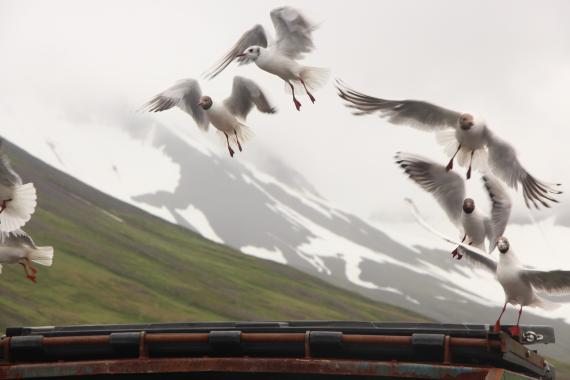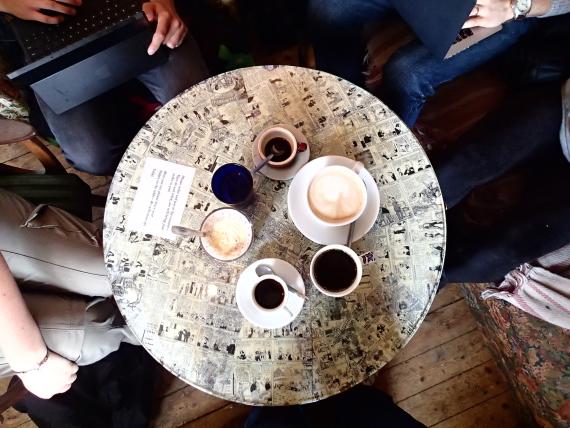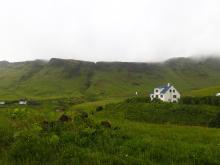By Brandon Oppenheim
Brandon was a student on the Summer 2014 CHID Study Abroad Program to Iceland on "Regeneration: Matter, Myth, and Memory in Iceland," led by CHID Associate Professor Phillip Thurtle.
If I had to summarize my trip in one word, I’d call it overwhelming. That word carries a lot of negative connotations, but I mean it in its multitude of potential definitions. That is, yeah, I’m overwhelmed in the fact that I’m tired. I’m worn out. I just experienced startlingly different geographies, types of communities, cultures, humor styles, etc., in the span of two months, traveling around the entire country of Iceland in a circular fashion. It’s hard to process to the point where I’m still trying even now, over a month later, every night before I sleep. As in actually my last thoughts before bed every night since have been some strange memory of the trip that still seems to cling to my brain like a vampire squid tentacle. And in that, maybe “overwhelming” isn’t such a negative term. I’ve been washed over by these experiences that cause me to question how I experience life. Suddenly my perspective on the world isn’t as unique as I thought. Rather, it – my perspective – is a combination of my conversations, my experiences, my stories that I share and hear. That’s what we are, though. Stories. And each moment in life is kind of like a new chapter. Iceland was, for me, some weird profound thing that was so much more than just a new chapter. It was like a new way of reading the same book. Imagine a hunched over Literature professor slapping your hand as you just figured out what you think Brave New World or something is actually about. And when he slaps you, he says “you’re right”. And in awe, you say “well, sir, why did you slap me then?” “Because,” he responds, “you’re not the only one who is.”
So Iceland was a wake-up call. A realization that things are kind of dissonant and shifting. Moving at a glacial-speed, perhaps, but still steadfastly flowing like lava. And it’s a struggle for each of us to find the way we want to approach life and our experiences therein. Life has so many perspectives, and it’s our job to not necessarily occupy each one, but at least realize that many multiples of perspectives indeed exist. Iceland helped me realize that I actually could write poetry and stories and creative pieces that other people would really read and even relate to. Poetry became my lens that I attempted to understand things through. And I’m more than motivated now. The creativity I developed and fostered during the trip hasn’t dulled in the slightest. I’ve carried the experiences and new perspectives with me past the trip, and am constantly involving myself in creative projects that I honestly would never have considered without the experience of the study abroad opportunity.
The scariest part to me, and probably many other people who write and create, is the idea that something so close to your heart only really matters if you share it. It requires this ridiculous amount of vulnerability, a leap that many of us are unwilling to take, to share that kind of work. Iceland was kind of like the shove that forced me to do just that, to share my creative work with those also creating around me. A circle of thinkers and poets and sleepy students brought together with the simple demand to share ideas. To actually communicate to others. To connect thought to land. To animals, to nature, to city, to philosophy, to sounds and to books. To ourselves, even. And to each other, even more.
There are so many stories I created and learned while in Iceland, and many that will likely fade with time, burned into the back of my brain but irretrievable, except maybe in a deep sleep’s hazy dream. But those connections – the intermingling of our lives to other people’s lives, those will never fade. The mess we’ve made with each other’s lives, as if they were entangled webs; our now interwoven existences.
Maybe my thoughts about the trip are ambiguous. Maybe you, as a reader, wanted to hear about the fantastic landscapes that littered the country, the intense emotion of isolation that accompanied every thought, the fascinating interplay between academic readings and experiential learning. In the end, though, I tried to summarize my experience on the trip in the only way I really knew how.
This was the second to last poem I wrote on the trip, and I don’t think it has a name.
Even in the midst of these chilling winds, cold rains -
soaking past the layers and drenching your itching wool,
penetrating past the paper thin walls and into your tiny, stiff bed,
your soft pajama bottoms,
your overly grey blanket strewn haphazardly across your weary body -
deep into your dreaming mind, the cold permeates and makes itself known,
pushing your comfort out, prodding, peeking in and asserting itself.
“This…is my country” it says “so feel me deep & wicked.
Bend your bones & blankets to make room in your home.
Don’t try too hard to subdue me because
I am always here. I am the default of this place.”
Even with this plowing presence, even now
there is a sense of warmth.
Me?…No one ever asks, but I’ve found that warmth in people.
In the communication, connection, coffee breaks, silent walks,
midnight talks, songs sung, stories shared,
pleasures, fears, emotions bared.
I – we – make ourselves vulnerable enough to explore dreams while next to each other. We warm each other with our own bodies, and when our bodies run out of heat, we distract each other with stories. And yet, we never run out, because we are constantly making new ones, new memories to hold up and gaze at in wonderment until we store them back in the corners of our minds and cold rooms for safekeeping. We close our windows as tight as we can, but the lonely figure that gazes out of the room, kneeling on the bed so his face can press against the glass to see the sky change – purples, reds, blues – as the brilliant sun sets, leaving behind streaks of vibrant paint across the sky, interrupted by splotches of scattered and splattered clouds…that lone human still, given time, freezes to death – first in his heart, then his body, stiff still in contemplation. Until, long after the sun has set and the day is…well, becoming night – suddenly, the lone kneeler finds himself…not so alone anymore. Strange. And when the new figure enters the cold, dim room, a warmth floods the house, not just the room, and heats them both.
Others find warmth in poetry, in expressing or reading – either way, feeling, and recognizing not only the beauty in poetic expression, but the absences and the limitations of that form. The imperfection of capturing emotion, the struggle, and finally, the inability, to translate thought –> emotion –> word –> connection…this imperfection takes on a form of its own. An oceanic form, incomprehensibly deep, treacherous & tumultuous, littered with floating debris and birds.
Anyways, to not get carried away, here’s the kind of point I’m approaching, if poems can even have points. It’s that…well, warmth emerges not in opposition to coldness, but out of it.
So even here, on top of glaciers, on windy mountain sides and turf house roofs…Even here, in this country of Ice, these connections form and sustain, even when they fade. It’s worth your time to step back from the windowed view of the vast night, your pretty frame of the moon, and recognize the loneliness in the warm, sun-filled day, as well as the connections in the stark, shadowed cold of night. Keep that warmth, but don’t extinguish the cold. Hold each in your hands, and shift them around once in a while.

